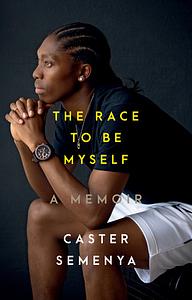Take a photo of a barcode or cover
fast-paced
Inspiring, frustrating, and straight to the point. Loved the candid POV from Caster about her own experiences.
fast-paced
This one is hard for me to rate.
I can't say that I really enjoyed the book, and the other reviewers are correct that this really needed an editor, but overall, I struggle with memoirs, and that's a me problem.
||Caster's insistence that her condition didn't give her any extra advantage seemed silly to me while reading. She even points out that many elite athletes have biological quirks that give them an advantage! That's what make them elite! But when it comes to her, then she didn't have any advantage and it was just hard work.||
Obviously, what she went through sucked, and I am definitely on the "they should've let her run" side. Unfortunately, the tone and writing style didn't work for me.
I can't say that I really enjoyed the book, and the other reviewers are correct that this really needed an editor, but overall, I struggle with memoirs, and that's a me problem.
||Caster's insistence that her condition didn't give her any extra advantage seemed silly to me while reading. She even points out that many elite athletes have biological quirks that give them an advantage! That's what make them elite! But when it comes to her, then she didn't have any advantage and it was just hard work.||
Obviously, what she went through sucked, and I am definitely on the "they should've let her run" side. Unfortunately, the tone and writing style didn't work for me.
informative
inspiring
reflective
medium-paced
adventurous
challenging
emotional
funny
hopeful
informative
inspiring
reflective
sad
tense
medium-paced
Well written, to the point, informative, a captivating story by a really bad-ass woman who does not take anyone's shit.
emotional
inspiring
reflective
medium-paced
hopeful
informative
inspiring
reflective
medium-paced
I had never heard of Caster Semenya or her story before reading this book. It brought a whole new perspective to the sports and gender discourse that's been going on as of late.
What makes something an advantage, be it having a different hormone level, a certain set of genitals, some amount of money, some access to resources? The obsession with regulating people's bodies to the end of "fairness" completely fails to give independent reasons why someone's genitals or hormones are governable "advantages" but socioeconomic status, place of birth, access to education, race, and even an infinitesimal number of other genetic sequences aren't.
Caster Semenya is, as she says, a different kind of woman. Someone who worked incredibly hard for her goals, and whose private medical status was made to be a spectacle and debate before she was even aware of it. I am shocked by the attitudes of the IAAF and other athletes as described in this book, and immensely inspired by Caster's resilience in the face of it. This is an essential story to the entire conversation of gender categories and regulation in elite sports.
What makes something an advantage, be it having a different hormone level, a certain set of genitals, some amount of money, some access to resources? The obsession with regulating people's bodies to the end of "fairness" completely fails to give independent reasons why someone's genitals or hormones are governable "advantages" but socioeconomic status, place of birth, access to education, race, and even an infinitesimal number of other genetic sequences aren't.
Caster Semenya is, as she says, a different kind of woman. Someone who worked incredibly hard for her goals, and whose private medical status was made to be a spectacle and debate before she was even aware of it. I am shocked by the attitudes of the IAAF and other athletes as described in this book, and immensely inspired by Caster's resilience in the face of it. This is an essential story to the entire conversation of gender categories and regulation in elite sports.
A compelling (often rage-inducing) story, of course, but it needed an editor to address the repetitive nature contained within. Even the ending was essentially told twice.
Caster Semenya was brought up as a girl, a tomboy who played football. There are many kinds of girl, she says. She was always determined to be famous and found her calling in running. She trained alone for a long time before her talent was spotted. When she started winning major races, the IAAF took notice and Caster was subjected to humiliating tests, sometimes without having been told what was being done. She has taken legal action about her human rights being compromised.
She agreed reluctantly to go on the pill to reduce her testosterone levels so that she could continue competing. The IAAF had devised criteria that Caster says was not scientific. She still won many races, in spite of the drug having adverse effects on her health. Her margins of victory were in line with elite women runners, and sometimes she was defeated by the same runners who criticise her.
Semenya was forced by the IAAF to give up competition but she now crusades on behalf of female athletes who have DSD. She does not think of herself as intersex and considers the idea of a 3rd category for intersex and trans athletes of "Other" as shocking and a human rights abuse.
Semenya was a true champion and this is a frank and shocking account of how she and other women with a DSD have been treated.
She agreed reluctantly to go on the pill to reduce her testosterone levels so that she could continue competing. The IAAF had devised criteria that Caster says was not scientific. She still won many races, in spite of the drug having adverse effects on her health. Her margins of victory were in line with elite women runners, and sometimes she was defeated by the same runners who criticise her.
Semenya was forced by the IAAF to give up competition but she now crusades on behalf of female athletes who have DSD. She does not think of herself as intersex and considers the idea of a 3rd category for intersex and trans athletes of "Other" as shocking and a human rights abuse.
Semenya was a true champion and this is a frank and shocking account of how she and other women with a DSD have been treated.




